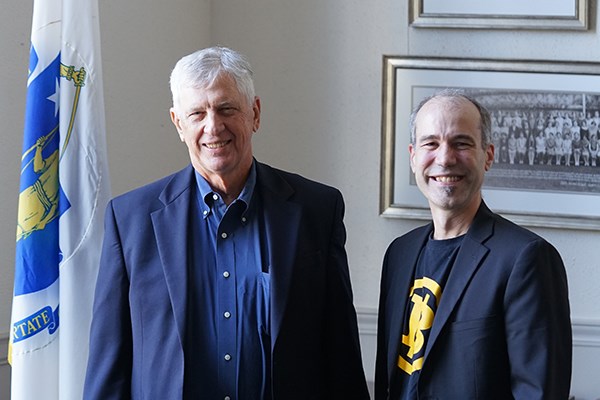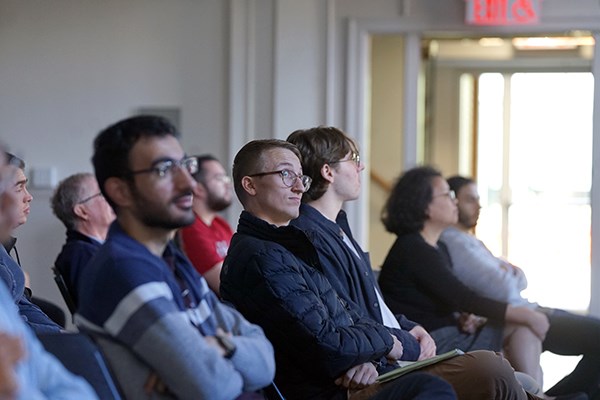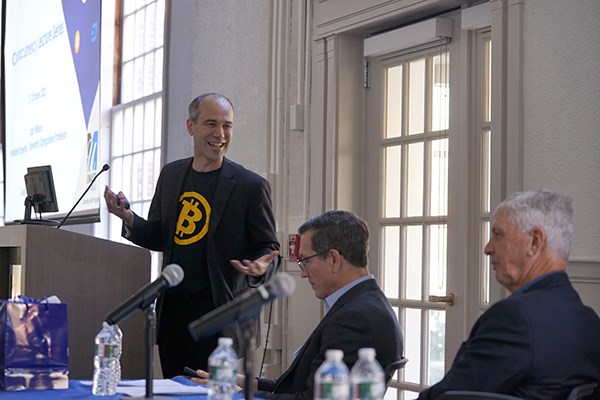William Johnson, Jack Wilson Square Off on Viability of Digital Currency, Blockchain
 Image by Ed Brennen
Image by Ed Brennen
11/04/2022
By Ed Brennen
Has cryptocurrency, which lost over $2 trillion in total value this year after hitting a peak of $3 trillion last November, been exposed as a fad — or worse, a fraud? Or is digital currency, and its underlying blockchain technology, really the financial future?
Those questions were at the center of a recent debate between William Johnson, associate professor of finance in the Manning School of Business, and the recently retired Jack Wilson, president emeritus of the UMass system and former distinguished professor of higher education, emerging technologies and innovation.
Hosted by the Global Entrepreneurship Exchange (GE2) program and the Jack M. Wilson Center for Entrepreneurship, the debate drew nearly 80 students and faculty to Alumni Hall (and close to 100 more online). It was moderated by GE2 Director William Yelle.
The debate pitted student against teacher — Johnson had Wilson as a professor while pursuing an engineering degree at Rensselaer Polytechnic Institute 30 years ago.
“I’m honored to be up here with someone who’s worked so hard for this community,” said Johnson, who teaches a graduate-level course on cryptocurrency and argued in support of the technology.
While acknowledging that people shouldn’t invest heavily in something as speculative as cryptocurrency (“As a small part of your portfolio, it’s fine. … I believe in diversification.”), Johnson said digital currencies do serve a purpose. Among them, he said, is the ability to quickly transfer money by sidestepping cumbersome banking networks, as well as access to financial services for people in underdeveloped areas.
“There are real problems to be solved, and they can be solved using these technologies,” he said.
Wilson countered that most cryptocurrencies are nothing more than a Ponzi scheme — a form of fraud that pays profits to early investors with funds from more recent investors, leaving the final investors with no funds left to compensate them. He cited the recent bankruptcy of crypto platform Celsius, which cost investors $5 billion, as a prime example.
 Image by Ed Brennen
Image by Ed Brennen
Wilson said skeptics such as himself often hear a frequent retort from crypto fans: “OK, Boomer. You’re too old, and you don’t understand this new thing.”
“But the sooner it goes away, the better,” said Wilson, who conceded that digital currencies are inevitable, but will be “backed by the full faith and credit of stable, reliable governments or organizations and follow good financial regulations.”
While there have been high-profile cases of cryptocurrency being used in criminal activity, such as last year’s Colonial Pipeline ransomware attack, Johnson cited statistics to put them in perspective. He noted that of $9.3 trillion in crypto transactions last year, $14 billion was lost in fraudulent transactions, money laundering and other criminal activities, or 0.15% of transactions. He compared this to 0.12% for checks ($12.4 trillion in transactions; $15.1 billion lost in fraud) and 0.07% for credit cards ($42.3 trillion in transactions; $27.9 billion lost in fraud).
 Image by Ed Brennen
Image by Ed Brennen
Johnson also compared this year’s crypto crash to the burst of the dot-com bubble in the late 1990s, when Amazon, eToys, Webvan and Pets.com lost $5.7 billion collectively. Today, Amazon is worth around $1.5 trillion, while the other three no longer exist.
“Some cryptocurrencies will fail terribly, just like IPOs in the dot-com boom, but the markets are good at figuring this out,” he said.
Wilson pointed out that mining for cryptocurrency — the complex process in which thousands of powerful computers race to solve a mathematical puzzle to earn the right to validate a transaction on a blockchain network and add it to a distributed ledger, earning a newly minted digital coin in the process — uses more energy “than many medium-sized countries,” mostly by burning fossil fuels.
Wilson added that blockchain is “a cool technology — a neat, decentralized database, basically,” but that it cannot scale to substantial use without burning “horrendous” amounts of energy.
 Image by Ed Brennen
Image by Ed Brennen
Seeing how much energy was used in crypto mining was “eye-opening” for Jessica Borst, a senior business major from Townsend, Massachusetts. She said she came into the debate “a little partial to crypto — I think it’s the future of currency,” so she leaned toward declaring Johnson the winner.
Senior business major Jasmine Varona, who has dabbled in small crypto investments, said Johnson’s views aligned more with “the new generation.” But hearing Wilson compare it to a Ponzi scheme made her second-guess herself.
“I never saw crypto in that perspective. I’ve always seen it as the future and never acknowledged the downside,” the Haverhill, Massachusetts, native said.
Regardless of which side they thought won, students enjoyed hearing two diametrically opposed viewpoints on cryptocurrency in a debate format.
“I loved it. I was entranced the entire time,” said Kevin Bragg, a senior information technology major from Pepperell, Massachusetts.
Bragg said he invests small sums of money — $10 or $20 — in different cryptocurrencies just to see how they work. In doing so, he’s fallen victim to several of the scams that Wilson mentioned. But Bragg doesn’t see that as a deal-breaker, noting that criminal organizations existed long before the first cryptocurrency, Bitcoin, came along in 2009.
“Cryptocurrency didn’t create these crimes, and it’s not going to stop it,” he said, adding, “Cryptocurrency is not going away.”
